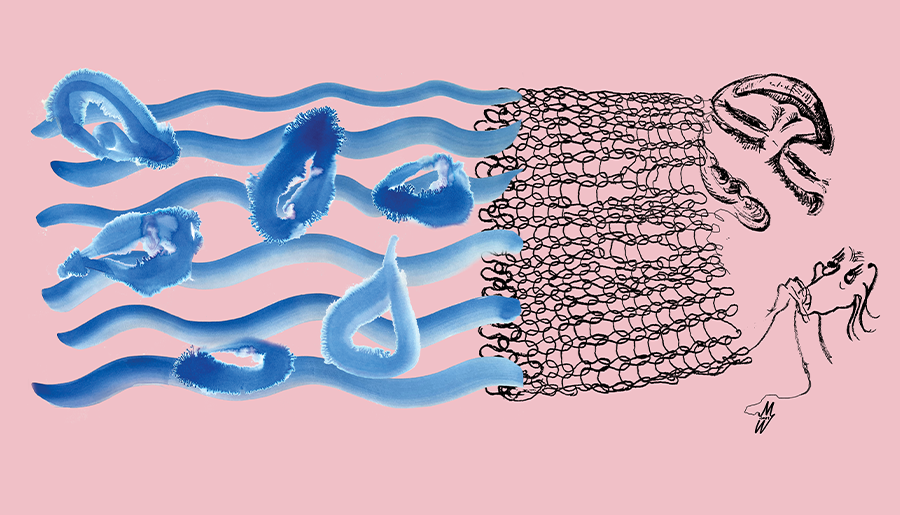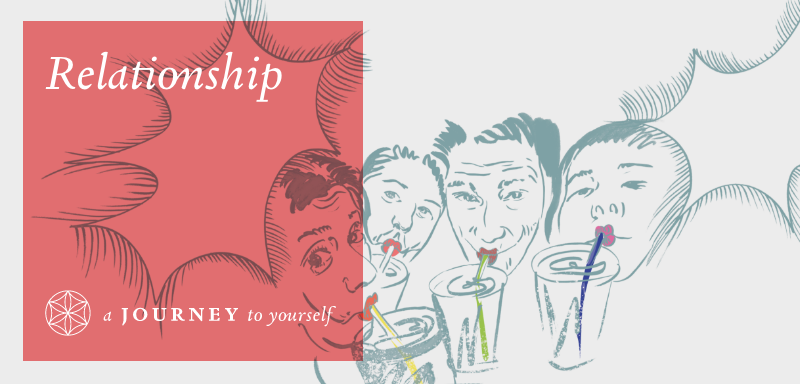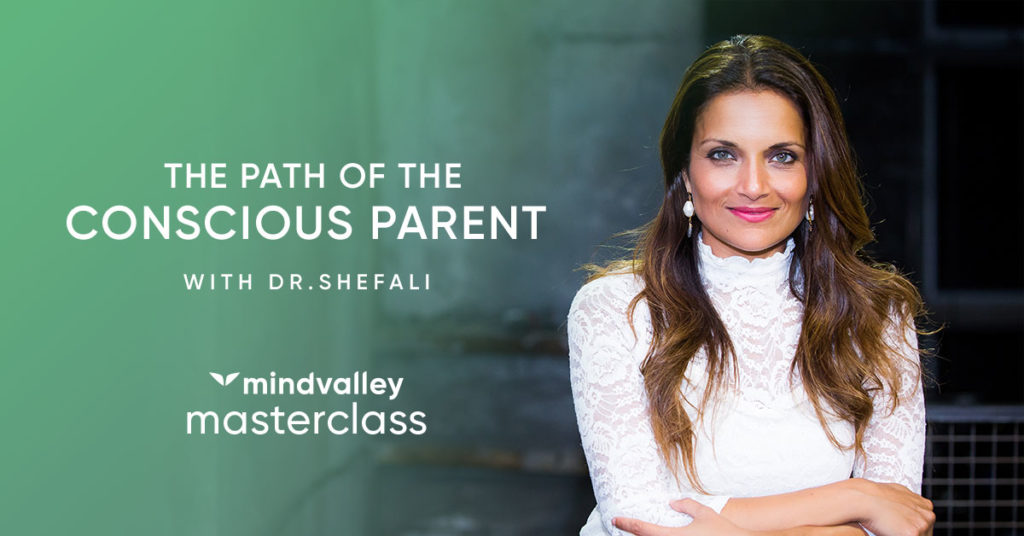Once the basic needs (physiological and security) of the newly arrived soul are secured by the bond it begins to become more and more involved in the outside world. Thus, becoming more and more anchored to the physical plane and gradually realizing that it is becoming a part of something greater than itself. Therefore, it begins to enter into various relationships, smoothly penetrating the network of interconnected connections.
In this article you will learn:
- What feelings are.
- How they differ from emotions
- And what their types are.
It slowly begins to build their ego, the task of which is to secure their survival in the material world. This is where they innate biological mechanism comes in handy – the limbic system, i.e. the mammalian brain. Thanks to it, with the help of chemicals of pleasure or stress, they builds the first neural circuits in their brain, which cause the automation of certain behaviors important from the point of view of the ego’s purpose: survival. In this way, they learns what behaviors bring them pleasure and which they should avoid. With the help of limited emotions that they may experience, they is forced to take specific actions aimed at teaching their how to independently secure their basic needs in the future. Of course, unless the system is disrupted by the dysfunctional behavior of their parents.
Emotions come and go fast, but they’re intense and powerful.
A young child usually expresses them naturally and spontaneously. However, the process of human socialization, which lasts from birth through early childhood, school, adolescence, and adulthood, leads to the creation of certain structures and norms. And these lead to not expressing and not showing emotions, pushing them into the child’s subconscious. Which will result in, for example, stiffening their body or psychosomatic diseases in the future.
The emotional state also determines what the child pays their attention to. What they remembers and what they learns. Thus, building their beliefs. Also, it influences their decision making and choices. Strong emotions, sadness or joy, also influence the way they looks at the world, whether positive or negative. And also on what social relationships they creates. Can the child name what they feels, does it accurately interpret other people’s emotions, does it avoid others and distances themself, or is they open to others? How their health works, positive and negative emotions trigger different physiological responses in the body. How does they express their creativity, can they cooperate with others and use their emotions so that they are tools.
Interpretation of emotions made on the basis of cultural patterns and experiences encoded in the child’s memory and the assessment of the situation dictated by them are feelings.
They are the conscious subjective experience of emotions. A state of consciousness resulting from emotions, sentiments, or desires. Feelings develop gradually and reflect your relationship to reality. They are only felt and abstract in nature. They cannot be touched. It is your attitude to specific events, people and elements of the world around you. They arise from abstract thinking, that is, the primate brain (frontal lobe of the brain). They are defined in words and represent the remnants of emotions. The same emotion, however, can also be interpreted as a different feeling. However, they are more complex than emotions and directed at some object, e.g. a person. Which means that they consist of various components, not only emotional. For example, the feeling of love is: attention, acceptance, appreciation, passion, closeness, commitment, freedom and tenderness.
Feelings are permanent.
They can last for days, months, and years, and sometimes a lifetime, even after the object of affection dies. Depending on durability and intensity, they are divided into:
- moods – lasting several days,
- passions – persistent tendencies to experience different moods in connection with specific goals of human aspirations, e.g. greed,
- sentiments – persistent likes or dislikes.
Or an object on:
- moral feelings – these are feelings that arise in coexistence and cooperation with other people. They reflect the attitude towards others, the products of their hands or minds, as well as the norms and rules of conduct. They can be mature (guilt, remorse) and immature (fear of punishment, curiosity, excitement),
- aesthetic feelings – emotional experiences that respond to beauty. They concern works of art and natural phenomena. They occur when you feel deeply connected to what you are seeing or dealing with.
- and intellectual feelings – these are feelings that appear under the influence of the content of cognitive processes and actions leading to obtaining information, strongly related to the functioning of the mind (interest, doubt, satisfaction).
Feelings are not as easily recognizable as emotions.
You cannot recognize by the behavior or facial expressions of the other person what feelings they have towards you. Mainly because during your development you learn how and when you can and should show your feelings, and when to hide. Thanks to this, you adapt to the moral norms prevailing in your society. This makes it easier for you to relate and live with other people in your culture.
The human emotional sphere did not begin to be noticed in the 1960s when the concept of emotional intelligence was developed.
Described by Daniel Goleman in the book “Emotional Intelligence”. However, it was not until the 1990s that the first official theory of “emotional intelligence” was defined as the ability to monitor one’s own and others’ feelings and emotions to distinguish between them, and to use that information as a factor to guide a person’s thinking and actions. Including:
- Knowing your emotions.
- Managing your emotions.
- Motivating yourself.
- Recognizing emotions in others – empathy.
- Relationship handling.
Without the emotional sphere, it is impossible to understand other people or enter into a relationship with them. Relationships are the most important aspect of our existence. People who have good interpersonal relationships enjoy better mental and physical health and live longer lives.
Feelings are a natural endowment for all of us.
If emotional needs, especially the need for love and bonds, are properly satisfied, they develop from birth. A child whose emotional needs were not properly met may grow up to be cut off from their feelings or completely devoid of them. Avoidance of feelings, on the other hand, underlies the entire spectrum of personality disorders, such as narcissism and borderline. In this case, the mechanisms that protect against experiencing feelings are fixed in the form of rigid patterns of behavior.
Often times, you also don’t allow yourself to have feelings that you’d rather not feel. You deny them, avoid them, and don’t want to confront them. Sometimes you even try to hide from yourself that you feel jealous, afraid or envious. You want to get rid of feelings that we consider destructive. The way you deal with your feelings depends on how your parents and guardians treated you.
A child cannot be afraid of its feelings or feel guilty about them.
Parents should not judge them or their feelings as bad, punish them for their feelings, or ridicule them. Ignore or minimize their importance. They should listen carefully and show the child that they really care about understanding their point of view. Realize that they has their reasons to feel exactly that they feels it, even though from their point of view they seem ridiculous or inappropriate to the situation. When a child trusts their parents and tells about what they feel, you should appreciate their openness and trust.
Past events in your life are used to form patterns in your mind, and based on those past experiences, you expect your life to follow a certain scenario. Feelings are your subjective description of your emotional state, a bodily reaction to the satisfaction or unmet needs that are important to you at a given time, e.g. you feel sad because you need closeness. So your past feelings affect your present and future life.
Thanks to our partnership with Mindvalley, you can now learn conscious parenting from the best experts in the world.
Discover a new model of parenting Oprah called “Revolutionary” and “Life-changing” so you can create the ideal environment for your children to thrive and blossom into their most authentic self with conscious parenting expert, Dr. Shefali Tsabary




